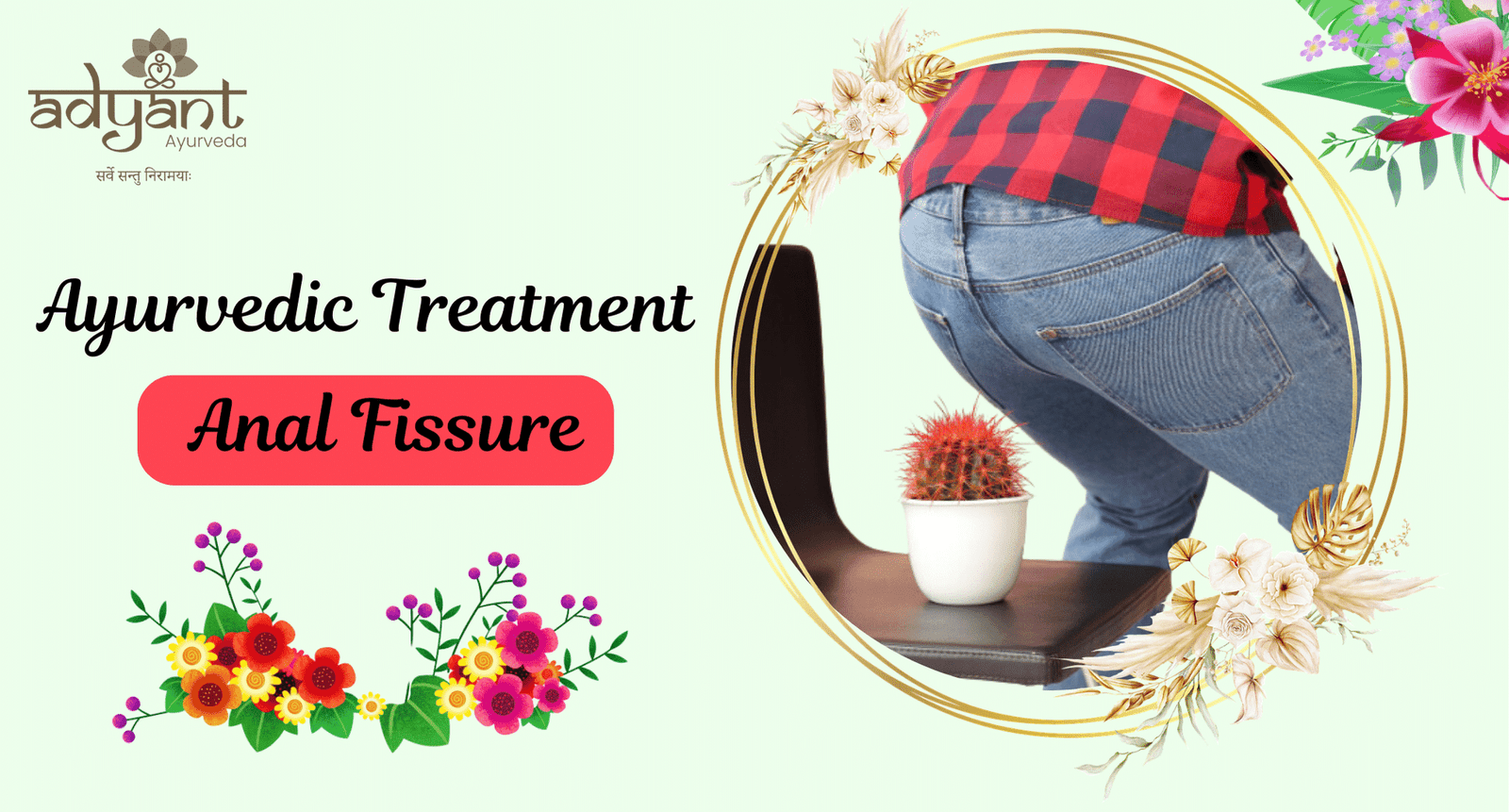
Anal Fissure Ayurvedic Treatment: Anal fissures can be a painful and discomforting condition that affects many individuals. In Ayurveda, anal fissures are viewed as an imbalance in the body’s doshas, primarily involving the Vata dosha. Adyant Ayurveda offers holistic approaches to treating anal fissures, focusing on natural remedies and lifestyle modifications. In this blog, we will delve into the Ayurvedic perspective on anal fissures, including signs, symptoms, and effective treatments.
Get a Free Consultation By Downloading Our App “AyurCare“
Anal Fissure Ayurvedic Treatment: Ayurvedic Understanding of Anal Fissures
Anal fissures refer to small tears or cuts in the lining of the anus, leading to pain, bleeding, and discomfort during bowel movements. Anal Fissure Ayurvedic Treatment involves balancing vata dosha. In Ayurveda, this condition is often attributed to aggravated Vata dosha, which disrupts the normal functioning of the anal muscles and tissues.
You May Also Like: Ayurvedic Doshas: Vata, Pitta, Kapha
Ayurvedic Perspective on Risk Factors for Anal Fissures
In Ayurvedic perspectives, the risk factors associated with anal fissures are viewed through the lens of dosha imbalances and lifestyle habits that contribute to the development or exacerbation of this condition. Here’s an exploration of these risk factors from an Ayurvedic viewpoint:
- Imbalanced Doshas: According to Ayurveda, an imbalance in the Vata dosha plays a significant role in the development of anal fissures. When Vata becomes aggravated due to factors like improper diet, stress, or irregular lifestyle habits, it can lead to dryness and hardening of stools, making the anal tissues more susceptible to tears and cuts.
- Dietary Factors: Anal Fissure Ayurvedic Treatment involves Dietary recommendations. Consumption of dry, spicy, and processed foods that aggravate Vata dosha can increase the risk of anal fissures. Lack of sufficient fiber in the diet leads to constipation, straining during bowel movements, and increased pressure on the anal region, contributing to fissures.
- Dehydration: Inadequate water intake can lead to dehydration, making stools harder and more difficult to pass. This increases the likelihood of straining during bowel movements, which can lead to the development of anal fissures.
- Poor Bowel Habits: Irregular bowel habits, such as holding back bowel movements or ignoring the urge to defecate, can lead to constipation and straining. This puts undue pressure on the anal tissues and increases the risk of fissures.
- Sedentary Lifestyle: Lack of physical activity and sedentary habits can contribute to sluggish digestion and poor bowel movements. Regular exercise is essential in Ayurveda to maintain healthy digestive functions and prevent conditions like constipation and anal fissures.
- Chronic Constipation: Individuals with chronic constipation are at a higher risk of developing anal fissures due to frequent straining and pressure on the anal canal. Ayurvedic therapies focus on resolving constipation through dietary modifications, herbal remedies, and lifestyle changes.
- Anal Hygiene: Anal Fissure Ayurvedic Treatment involves Anal Hygiene. Poor anal hygiene, such as rough wiping or excessive use of harsh toiletries, can irritate the anal tissues and contribute to the development or worsening of anal fissures.
- Psychological Factors: Stress, anxiety, and emotional disturbances can impact digestive health and contribute to Vata aggravation. Ayurvedic practices like yoga, meditation, and stress management techniques are recommended to balance the mind-body connection and reduce the risk of anal fissures.
Read Also: Ayurvedic Treatment for Stress and Anxiety
By addressing these risk factors through Ayurvedic principles of diet, lifestyle, and holistic healthcare, individuals can reduce their susceptibility to anal fissures and maintain optimal digestive wellness. Consulting with an Ayurvedic practitioner at Adyant Ayurveda can provide personalized guidance and treatments tailored to individual dosha imbalances and health needs.
Anal Fissure Ayurvedic Treatment: Signs or Symptoms
Let’s understand the signs or symptoms of it before Anal Fissure Ayurvedic Treatment. Below we have listed some symptoms for Anal Fissure:
- Pain during Bowel Movements: One of the primary symptoms of anal fissures is a sharp pain or burning sensation during bowel movements.
- Bleeding: Anal fissures can cause bright red blood to appear on toilet paper or in the toilet bowl after passing stools.
- Itching & Discomfort: Individuals with anal fissures may experience itching, discomfort, or a feeling of incomplete bowel emptying.
- Tenderness & Swelling: The area around the anus may become tender, swollen, or sensitive to touch.
Read Also: Treat Piles fissure Fistula Naturally
Ayurvedic Diagnosis of Anal Fissures
In Anal Fissure Ayurvedic Treatment, diagnosing anal fissures involves assessing the individual’s dosha imbalance, digestive health, and overall well-being. Ayurvedic doctors at Adyant Ayurveda use a combination of clinical examination, pulse diagnosis (Nadi Pariksha), and understanding of the patient’s lifestyle and dietary habits to determine the root cause of anal fissures.
Know Also: Best Ayurvedic Clinic in Bangalore
Anal Fissure Ayurvedic Treatment Approaches
- Balancing Vata Dosha: The primary focus of Ayurvedic treatment for anal fissures is to balance the aggravated Vata dosha. This is achieved through herbal medicines, dietary changes, and lifestyle modifications.
- Herbal Remedies: Adyant Ayurveda offers herbal formulations that help soothe anal tissues, reduce inflammation, and promote healing. Ingredients like Triphala and Aloe Vera, are commonly used in these formulations.
- Dietary Recommendations: Patients are advised to follow a Vata-pacifyingdiet, including warm, moist, and easily digestible foods. Avoiding spicy, dry, and processed foods is recommended to prevent further aggravation of the condition.
- Lifestyle Modifications: Anal Fissure Ayurvedic Treatment emphasizes the importance of maintaining regular bowel habits, staying hydrated, and practicing stress-reducing techniques like yoga and meditation.
- Panchakarma Therapies: In severe cases or chronic anal fissures, Panchakarma therapies such as Basti (medicated enema) may be recommended to detoxify the body and promote healing.
Read Also: Basti Treatment in Ayurveda
Ayurvedic Home Remedies for Anal Fissures
- Sitz Baths: Soaking in warm water with added herbal extracts like Triphala or Neem can help reduce pain and inflammation.
- Herbal Suppositories: Inserting medicated herbal suppositories containing Guggulu, Yashtimadhu, or Haritaki can provide relief and aid in healing.
- Dietary Changes: Consuming fiber-rich foods, and fruits like pomegranate, and drinking plenty of water can soften stools and ease bowel movements.
Anal Fissure Ayurvedic Treatment: Lifestyle Tips
- Maintain Hygiene: Proper anal hygiene, including gentle cleaning after bowel movements, is essential to prevent further irritation.
- Avoid Straining: Straining during bowel movements should be avoided, as it can worsen anal fissures.
- Regular Exercise: Engaging in regular physical activity helps improve digestion, circulation, and overall well-being.
- Stress Management: Stress can exacerbate Vata imbalance, so practicing stress-relieving techniques is beneficial.
Read Also: Ayurvedic Home Remedies for Constipation
Why Choose Adyant Ayurveda for Anal Fissure Ayurvedic Treatment in Bangalore, India?
Choosing Adyant Ayurveda for Anal Fissure Ayurvedic treatment offers several compelling reasons:
- Expertise in Ayurveda: Adyant Ayurveda specializes in Ayurvedic medicine, with a team of experienced Ayurvedic doctors who understand the principles of holistic healing and natural therapies.
- Individualized Treatment: Patients receive personalized treatment plans based on their dosha imbalances, overall health, and specific symptoms related to anal fissures. This tailored approach ensures effective and targeted healing.
- Natural Remedies: Adyant Ayurveda emphasizes the use of herbal formulations, dietary modifications, lifestyle adjustments, and Ayurvedic therapies to address anal fissures naturally, without relying on invasive procedures or strong medications.
- Focus on Root Cause: Instead of just treating symptoms, Adyant Ayurveda identifies and addresses the root cause of anal fissures, such as Vata imbalance, constipation, or dietary factors. This comprehensive approach promotes long-term healing and prevents recurrence.
- Safe and Gentle Therapies: Ayurvedic treatments at Adyant Ayurveda are gentle on the body and have minimal side effects compared to conventional treatments. This makes them suitable for individuals of all ages, including children and the elderly.
- Holistic Wellness: Apart from Anal Fissure Ayurvedic Treatment, Adyant Ayurveda promotes overall well-being by addressing other health concerns, improving digestion, boosting immunity, and enhancing vitality.
- Proven Success: Adyant Ayurveda has a track record of successful outcomes in treating anal fissures and other digestive disorders. Patients experience relief from symptoms, improved bowel health, and enhanced quality of life.
- Patient-Centric Care: The team at Adyant Ayurveda prioritizes patient satisfaction and comfort. They provide compassionate care, thorough consultations, and ongoing support throughout the treatment journey.
- Accessible Services: Adyant Ayurveda offers convenient appointment scheduling, teleconsultations, and online resources, making it accessible for patients from diverse backgrounds and locations.
- Trust and Reputation: With a reputation for excellence in Ayurvedic healthcare, Adyant Ayurveda is trusted by patients seeking natural and effective solutions for Anal Fissure Ayurvedic Treatment and other health conditions.
Book Your Appointment Now: Best Ayurvedic Hospital in Bangalore
Conclusion
Ayurvedic treatment for anal fissure focuses on restoring balance to the body’s doshas, particularly Vata dosha, through herbal remedies, dietary modifications, and lifestyle changes. Adyant Ayurveda offers comprehensive solutions for anal fissures, emphasizing holistic healing and natural therapies. By addressing the root cause and adopting preventive measures, individuals can experience relief from anal fissures and improve their overall digestive health.
Read Other Related Blogs
- Kshar Karma Treatment
- Ksharsutra Treatment in Bangalore
- Panchakarma Treatment
- Ayurveda treatment for Digestive Disorder
Frequently Asked Questions Related to Anal Fissure Ayurvedic Treatment
Ques: What is Ayurvedic treatment for anal fissure?
Ans: Ayurvedic treatment for anal fissure involves a holistic approach that focuses on balancing the doshas, promoting digestive health, and using natural remedies to heal anal tissues.
Ques: How does Ayurveda diagnose anal fissures?
Ans: Ayurvedic diagnosis of anal fissures involves assessingdoshaimbalances, examining symptoms like pain and bleeding during bowel movements, and considering the patient’s overall health and lifestyle.
Ques: What are the key herbs used in Anal Fissure Ayurvedic Treatment?
Ans: Herbs commonly used in Ayurvedic treatment for anal fissures include Triphala, Aloe Vera, Kutaj, Guggulu, Yashtimadhu, and Haritaki, among others. These herbs help soothe inflammation, promote healing, and balance Vata dosha.
Ques: What dietary recommendations are given in Ayurveda for anal fissure?
Ans: Ayurvedic dietary recommendations for anal fissure focus on a Vata-pacifying diet, including warm, moist, and easily digestible foods. Fiber-rich foods, fruits like pomegranate, and adequate hydration are also emphasized.
Ques: Are there any lifestyle changes recommended in Ayurveda for anal fissure?
Ans: Yes, Ayurveda recommends lifestyle changes such as regular exercise to improve digestion, stress-reducing techniques like yoga and meditation, maintaining proper anal hygiene, and avoiding straining during bowel movements.





